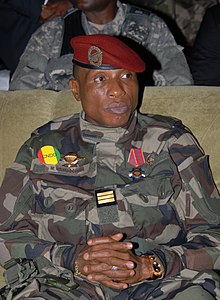Moussa Dadis Camara

Moussa Dadis Camara (* 1964 in Kouré , Lola Prefecture ) was a captain in the Guinean army and was de facto president of the country from December 24, 2008 to December 3, 2009.
After the death of the previous President Lansana Conté on December 22, 2008, Camara announced that he would be in his capacity as head of a group of 26 military and six civilians who had formed the “National Council for Democracy and Development” ( Conseil National de la Démocratie et du Développement , CNDD), have temporarily taken power in Guinea. As a result of an attack on December 3, 2009, he left for Morocco on the same day, seriously injured .
Life
Camara attended elementary school and high school in Nzérékoré . After graduating from high school in 1986, he studied at Gamal Abdel Nasser University in Conakry , where he received his master's degree in finance. When he joined the army in 1990, Camara received the rank of corporal . At first he served with the road pioneers in Conakry (Sangoyah barracks), but was appointed head of the army's fuel department shortly afterwards. Between 1996 and 2005 he spent a total of four years in Germany and was screened at the Bundeswehr - Officers School Dresden trained and replenishment school in Bremen. According to his own information, he completed the parachutist course of the Bundeswehr, he regularly wears the beret badge of the German paratrooper troops, but not the German, but the French parachutist badge . Upon his return home, he was appointed head of the armed forces' fuel services in the Ministry of Defense.
Camara was one of the main leaders of the putsch of Christmas 2008. Since Camara regularly spoke German during the planning and implementation of secrecy and had potential opponents such as Contès's son Ousmane as well as the naval chief and high-ranking police arrested with supposedly “German thoroughness”, the putsch was also “ le putsch allemand ”(German putsch).
Camara, unlike the majority of Guinea's population, is a Christian . He belongs to the Guérzé ethnic group and therefore does not come from any of the three major ethnic groups Mandinka , Peul or Susu , most of whom are rivaling for power in Guinea. He is married, has six children and speaks five languages: Kpèlé , Susu , Malinké , French and German .
Camara promised free elections for the end of December 2010, but ruled the country increasingly authoritarian. In September 2009 riots broke out and were bloodily suppressed. In terms of foreign policy, Camara and his government were moving closer to the People's Republic of China.
On December 3, 2009, Camara was seriously injured in a gun battle and flown to Morocco for treatment. Apparently he was shot by the head of his own presidential guard, Aboubacar Toumba Diakité , during an argument. Camara initially announced that he would not run for the 2010 presidential election, but then changed his mind, which aroused resentment among the civilian opposition. Furthermore, he wanted to renegotiate the contracts for the mining of bauxite, Guinea's most important raw material, with the producing countries on more favorable terms for his country. This is seen as the reason why representatives of the military junta accused France of being involved in the attack on Camara. Camara's deputy Sékouba Konaté took over the official business and initiated Guinea's return to democracy. Camara approved the appointment of opposition politician Jean-Marie Doré as prime minister of a transitional government and said he would continue his recovery process outside of Guinea.
Web links
Individual evidence
- ^ L 'Occidental, December 5, 2009: "Moussa Dadis Camara hospitalisé au Maroc en état difficile" ( Memento of the original of September 23, 2015 in the Internet Archive ) Info: The archive link was inserted automatically and not yet checked. Please check the original and archive link according to the instructions and then remove this notice.
- ↑ Guinea Oye, December 21, 2009: “Col. Keita: Camara Still Recovering and "Festivities" Planned for Coup Anniversary "
- ↑ Focus, September 30, 2009: "Guinea's junta chief trained by the Bundeswehr"
- ↑ a b Die Welt, September 20, 2009: "Bundeswehr trained brutal junta boss"
- ↑ tagesschau.de: "Colonel Camara - the 'German' putschist" ( Memento from October 2, 2009 in the Internet Archive )
- ↑ Berliner Zeitung, October 1, 2009: "The German Putschist"
- ↑ Private weblog, December 25, 2008: "Le Président autoproclamé de Guinée, un diplômé de l'université de Conakry"
- ↑ Guineenews, December 26, 2008: "Qui est Moussa Dadis Camara, le nouveau président de la Guinée?" ( Page no longer available , search in web archives ) Info: The link was automatically marked as defective. Please check the link according to the instructions and then remove this notice.
- ↑ taz, December 4, 2009: "Juntach chief seriously injured in assassination attempt"
- ↑ BBC, December 4, 2009: "Shot Guinea strongman Camara 'flies to Morocco'"
- ^ The daily newspaper : Zivilist becomes Prime Minister , January 20, 2010.
| personal data | |
|---|---|
| SURNAME | Camara, Moussa Dadis |
| BRIEF DESCRIPTION | Guinean captain and self-appointed president |
| DATE OF BIRTH | 1964 |
| PLACE OF BIRTH | Kouré , Lola Prefecture |